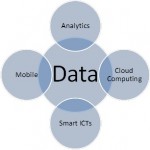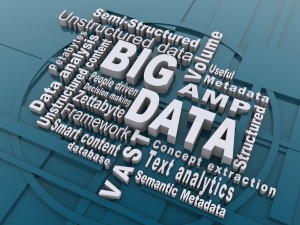I attended in October the OECD Technology Foresight Forum, an annual event of the OECD Committee for Information, Computer, and Communications Policy (ICCP) to help identify opportunities and challenges for the Internet Economy posed by technical developments.
This year, the event was focused on Big Data, and more specifically “Harnessing data as a new source of growth: Big data analytics and policies”. It was a one-day dedicated to the potential of big data analytics as a new source of growth, with expected positive impact on the economy and society as a whole, but also raising relevant challenges.
What do we mean by “Big Data”?
We can define “Big Data” as a compilation of data sets, which due to its quantity and complexity is difficult to manage with basic database management tools. Therefore, the concept has evolved and we talk now about the ability to detect, capture, communicate, store, search, manage, process, analyze data and share it. Big data sizes are in constant evolution, as its Volume is continuously growing, but also its speed (Velocity) and its Variety (data types and sources), that is why IBM uses a “3Vs” model to describe big data, including recently a 4thV by adding the term “Virtual”…
What to expect in the future?
According to a recent study by the research firm Gartner, by 2016, big data technology will account for $232 billion of worldwide IT spending, reaching $28 billion in 2012 and $34 billion in 2013. But this does not stop at the expenses, as the possibilities offered by Big data are very positive according to some reports, able to change and benefit economy and society as a whole.
That´s why the OECD is interested in this new phenomenon…
 During the OECD event, many interesting issues were raised from the economic perspectives (potential value) to the legal and regulatory challenges (privacy, IPRs, open access), but also it underlined the need of new skills for workers in this area for the future (IT, statistics, analysis of data, strategy…). Some speakers exposed the kind of data available and their use in different areas such as R&D, Marketing, public data.
During the OECD event, many interesting issues were raised from the economic perspectives (potential value) to the legal and regulatory challenges (privacy, IPRs, open access), but also it underlined the need of new skills for workers in this area for the future (IT, statistics, analysis of data, strategy…). Some speakers exposed the kind of data available and their use in different areas such as R&D, Marketing, public data.
Here are the main topics raised during the event…
Mateo Pacca, from McKinsey presented the high potential and value offered by Big Data but he also recalled that it is not easy to capture that value and that talent battle will be hard to get the best ones. One thing was clear: Big data will boost job creation, as presented Dominique Turq, from the Boostzone Institute, but we need to ensure that right skills are taught to our young students to grab the opportunity offered by the boom of the Big Data market.
The moderator of the event, Kenneth Cukier, from The Economist, reminded that Big Data is necessary and useful, but also a raw material of production and a new form of economic value, “a river that no one can stop”, according to Stephen McGibbon, from Microsoft. However, we need adapted public policies in order to not kill the baby before its full development.
Most of the speakers of the different sessions agreed with this vision: Laurent Liscia, Executive Director of OASIS said that it is also necessary to get the adequate standards to better take advantage of this new source of potential economic and social growth. Harry Halpin from W3C supported this opinion and underlined the need to bring a strong safety level for users to ensure privacy and security. The privacy challenges were presented by Omer Tene, Associate Professor at the College of Management School of Law, Rishon Le Zion, Israel, advocating for the need to develop a model where the benefits of data for businesses and researchers are protective of the individual privacy rights.
As a conclusion, all the speakers tried to summarize the main policy implications that the OECD should examine and include in its next 2013-2014 program at ICCP: the economic value, the economic impact, the enhanced skills necessary for Big data, privacy and ownership of data, open access and usability will be on the agenda, due to the relevance of this topic.
Telefónica and Big Data
As Big Data is one of the key building blocks of the digital economy, Telefónica is also very involved in this area. That is why it has recently launched a new global business unit dedicated to identify and unlock opportunities to create value from “Big Data. Telefónica considers that an approach in a pragmatic, smart and responsible way is essential and that Big Data has the potential to transform every part of business and society.
The benefits for all seem clear so let´s all work in this direction!
We will keep an eye on the OECD activities on Big Data and we will let you know the main outcomes in the next months…














